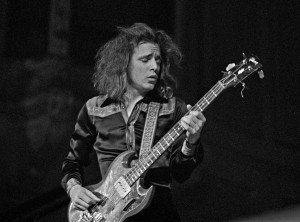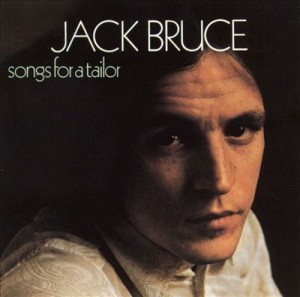 When I heard of Jack Bruce’s passing, the first thing I did wasn’t to grab one of his brilliant albums with Cream, but to pull his first two solo albums (absenting the free-jazz Things We Like album) off the shelf. While Eric Clapton retrenched into rootsy American rock after the dissolution of Cream and Blind Faith, Jack Bruce went further out, continuing to reinvent the song form, a work he started with songs like “Sunshine of Your Love” and “White Room.
When I heard of Jack Bruce’s passing, the first thing I did wasn’t to grab one of his brilliant albums with Cream, but to pull his first two solo albums (absenting the free-jazz Things We Like album) off the shelf. While Eric Clapton retrenched into rootsy American rock after the dissolution of Cream and Blind Faith, Jack Bruce went further out, continuing to reinvent the song form, a work he started with songs like “Sunshine of Your Love” and “White Room.
Songs for a Tailor and Harmony Row are brilliant, overlooked albums from Bruce that still sound as innovative, thought provoking and emotional as they did when they came out in 1969 and 1971. Bruce had an epic sense of song form then with free-floating rhythms and expansive melodies sung in that choir boy voice yearning to sing the blues. Songs like “Theme to an Imaginary Western” were later covered by Mountain with Felix Pappalardi who produced Cream and Bruce. “Rope Ladder” was a charge into lyrically surrealist space with words from Pete Brown and drums from John Marshall, who went on to join Soft Machine. And then there is the heart break of “Folksong” from Harmony Row with its plaintive organ and yearning melody.
Bruce was the first virtuoso bass player in rock. He was actually trained as a cellist at the Scottish Royal Academy of music before falling into London’s nascent blues scene as a bassist. Bruce’s early career included stints with Alexis Korner’s Blues Incorporated, John Mayall’s Bluesbreakers and Manfred Mann.
Bruce’s bass playing had the melodicism of Paul McCartney married to the chops of Charles Mingus. He set the stage for musicians like Stanley Clarke and Jaco Pastorius, but unlike them, Jack Bruce was all about the bass, no treble. If you witnessed Cream’s reunion concert several years ago at Royal Albert Hall, you heard his mastery of the bass in full-effect as the trio wove their incendiary improvisations, even stronger now than in the 1960s.
Bruce was the most experimental of the three Cream members although Ginger Baker comes close. Even before he’d left Cream, he’d recorded a free jazz album with saxophonist Dick Heckstall-Smith and drummer Jon Hiseman, both from Colosseum, and guitarist John McLaughlin just before he went to record with Miles Davis. He worked extensively with jazz composer Carla Bley, appearing on her Escalator Over the Hill album and subsequent releases including then-husband Michael Mantler’s renderings of Samuel Becket on No Answer.
“I was a big fan of Jack Bruce” claimed Carla Bley when I interviewed her in 1998 for NPR’s Jazz Profiles. “I liked his album Harmony Row very much. I just thought he was totally great. And I had met before when Gary Burton’s band was playing at the Fillmore in San Francisco opposite Cream. And I had met Jack Bruce and he knew everything I had ever done and I knew everything he had ever done and so we hit it off.”
Bruce went on to join another jazz great, drummer Tony Williams in Tony Williams Lifetime with McLaughlin and Larry Young for the incendiary Turn It Over fusion album.
The 70s were a bit muddled for Bruce who never attained the success of  Clapton as a solo artist. He signed up with Mountain’s Leslie West and Corky Laing after bassist, singer and Cream and Bruce produce Felix Pappalardi left that band. They became West, Bruce & Laing and recorded a trio of fairly sludgy hard rock albums. Throughout that decade and into the 80s, Bruce struggled with drug addiction while still playing with some of the leading figures of the day. One of his bands included Billy Cobham from the Mahavishnu Orchestra, guitarist Clem Clempson from Coliseum, and former Bruce Springsteen keyboardist/guitarist-turned fusionist David Sancious. He played in all kinds of configurations including recordings with Robin Trower, Lou Reed, Vernon Reid, ill-fated reunions with Ginger Baker and toured in Ringo Starr’s All Star Band.
Clapton as a solo artist. He signed up with Mountain’s Leslie West and Corky Laing after bassist, singer and Cream and Bruce produce Felix Pappalardi left that band. They became West, Bruce & Laing and recorded a trio of fairly sludgy hard rock albums. Throughout that decade and into the 80s, Bruce struggled with drug addiction while still playing with some of the leading figures of the day. One of his bands included Billy Cobham from the Mahavishnu Orchestra, guitarist Clem Clempson from Coliseum, and former Bruce Springsteen keyboardist/guitarist-turned fusionist David Sancious. He played in all kinds of configurations including recordings with Robin Trower, Lou Reed, Vernon Reid, ill-fated reunions with Ginger Baker and toured in Ringo Starr’s All Star Band.
Jack Bruce was an icon, but without iconic status. In a just universe songs like “Sunshine of Your Love”, “White Room”, Politician, “Deserted Cities of the Heart” “N.S.U.” and “I Feel Free” should be enough to put any artist into the upper pantheon, let alone that extraordinary bass playing and heavenly voice.
I got to interview Jack Bruce at his home in 1998 for the Carla Bley documentary. He was gracious, candid and funny. His recent Silver Rails album revealed no slacking in his skills or creativity.
I always felt there was more great music lurking in Jack Bruce. 71 is much too early to go these days.
John Diliberto

Also need to mention HUGE influence of his work with Graham Bond, where he played with Ginger Baker and from what I’ve read developed the camaraderie, musical sympathies, and long list of grievances that tied both men together for the rest of their lives.